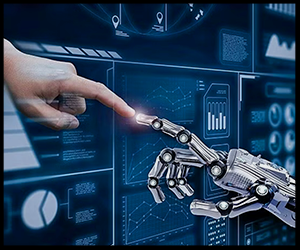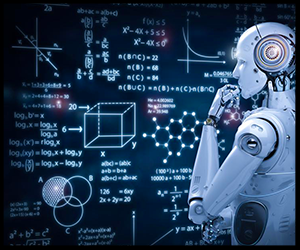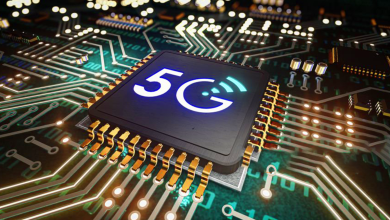Unlocking the Potential of Artificial Intelligence and Machine Learning
Artificial Intelligence and Machine Learning

In the ever-evolving landscape of technology, Artificial Intelligence two terms have become increasingly prevalent and essential in shaping the way we live and work: Artificial Intelligence (AI) and Machine Learning (ML). These cutting-edge fields have transcended the boundaries of science fiction to become integral components of our daily lives. In this article, we will explore the world of AI and ML, their significance, their applications, and the impact they have on various industries.
What Are Artificial Intelligence and Machine Learning?
Artificial Intelligence is the broader concept of machines or computer systems performing tasks that would typically require human intelligence. This can include problem-solving, natural language understanding, learning, and adapting to new information. AI seeks to simulate human cognition and decision-making processes in a machine.

Within the realm of AI, Machine Learning plays a pivotal role. Machine Learning is a subset of AI, focusing on the development of algorithms that enable machines to learn from and make predictions or decisions based on data. ML systems can improve their performance over time without being explicitly programmed, making them adaptable and capable of handling complex tasks.
The Foundation of AI and ML: Data
The fuel that powers AI and ML is data. These systems require vast amounts of data to learn, identify patterns, and make accurate predictions. The more data they have, the better they become at their tasks. This data can come in various forms, from structured data found in spreadsheets and databases to unstructured data like text, images, and videos.
In today’s digital age, we generate an immense amount of data every day. Every online purchase, social media post, and search query adds to the ever-growing pool of information. AI and ML use this data to make sense of the world and automate tasks, making them invaluable in numerous applications.
Applications of AI and ML
Healthcare
Artificial Intelligence One of the most promising applications of AI and ML is in the field of healthcare. From disease diagnosis to personalized treatment plans, these technologies are revolutionizing the way we approach medical care. ML algorithms can analyze medical images like X-rays and MRIs, helping physicians detect diseases and abnormalities more accurately and quickly. AI-driven chatbots and virtual assistants can provide 24/7 medical information and assistance, improving patient engagement and healthcare accessibility.
Finance
The financial industry has embraced AI and ML to enhance fraud detection, automate trading, and improve customer service. These technologies can analyze large datasets to detect unusual financial transactions, reducing the risk of fraud. They also power robo-advisors that offer investment recommendations based on individual financial goals and risk tolerance. In addition, AI chatbots are providing efficient and instant customer support in the financial sector.
Retail and E-Commerce
AI and ML have transformed the retail and e-commerce sectors. Recommendation systems powered by ML algorithms personalize product suggestions for customers, increasing sales and customer satisfaction. Inventory management has also become more efficient through predictive analytics, reducing costs and ensuring products are available when needed. Chatbots and virtual shopping assistants make online shopping experiences more interactive and convenient.

Transportation
The transportation industry is undergoing a major transformation due to AI and ML. Autonomous vehicles, guided by AI, promise safer and more efficient transportation. Predictive maintenance using ML algorithms ensures that vehicles and infrastructure are well-maintained, reducing breakdowns and accidents. Moreover, AI-based route optimization systems improve the efficiency of logistics and delivery services.
Education
Artificial Intelligence AI and ML are making strides in the education sector, offering personalized learning experiences and support for students. Adaptive learning platforms use ML to adjust the pace and content of educational materials to match individual student progress. Natural language processing (NLP) enables automated essay grading, and chatbots offer instant assistance to students with questions or concerns.
Natural Language Processing (NLP)
Natural Language Processing is a subfield of AI that focuses on the interaction between computers and human language. NLP enables machines to understand, interpret, and generate human language. It powers applications like language translation, sentiment analysis, chatbots, and voice assistants. NLP is integral in breaking down language barriers and enhancing communication between people from different linguistic backgrounds.
Image and Speech Recognition
AI and ML have made significant advancements in image and speech recognition. Image recognition systems can identify objects, people, and scenes in photos and videos. Speech recognition technology, like that used in virtual assistants such as Siri and Alexa, can understand and respond to spoken language. These applications are used in a wide range of fields, from security and surveillance to entertainment and accessibility.
Challenges and Ethical Considerations
While AI and ML offer immense potential, they also come with challenges and ethical considerations. Data privacy and security are paramount concerns, as the collection and utilization of vast amounts of personal data raise questions about how that data is handled and protected. Bias in algorithms is another significant issue, as AI systems can inadvertently perpetuate or amplify societal biases present in the data they are trained on.
Transparency and accountability in AI decision-making processes are necessary to build trust in these technologies. Regulatory frameworks and ethical guidelines are continuously evolving to address these concerns, aiming to strike a balance between innovation and responsible use.
The Future of AI and ML
The trajectory of AI and ML indicates a future where these technologies become even more integrated into our daily lives and industries. We can anticipate breakthroughs in areas such as:
Healthcare Diagnostics
AI-powered diagnostics will continue to advance, providing earlier and more accurate disease detection. Wearable devices and remote monitoring, combined with AI analysis, will enable individuals to take more control of their health.
Robotics
Robotic applications will expand, from autonomous drones for delivery and surveillance to advanced humanoid robots capable of performing tasks in unstructured environments. These robots will be used in healthcare, manufacturing, and other industries.
Natural Language Understanding
NLP will become even more sophisticated, enabling more natural and intuitive interactions with technology. Translation tools, chatbots, and voice assistants will better understand and respond to human language, making communication across cultures and languages seamless.
Climate and Environmental Impact
AI and ML will play a vital role in addressing environmental challenges. Predictive models will help in climate change monitoring and mitigation, and smart grids will optimize energy consumption. AI-powered agriculture and precision forestry will contribute to sustainable resource management.
Quantum Computing
Quantum computing, a rapidly advancing field, holds the potential to revolutionize AI and ML by performing complex computations at speeds currently unimaginable. This could lead to breakthroughs in fields such as drug discovery, materials science, and cryptography.

Conclusion
Artificial Intelligence and Machine Learning have transcended the realm of science fiction to become integral components of our daily lives and industries. They offer the promise of more efficient and personalized experiences in healthcare, finance, education, and various other sectors. While challenges and ethical concerns must be addressed, the future of AI and ML appears bright, with exciting advancements on the horizon.
As we continue to unlock the potential of AI and ML, it’s essential to approach their development and deployment with responsibility and ethics in mind. Striking a balance between innovation and ethical use is key to ensuring that these transformative technologies benefit society as a whole and contribute to a brighter, more connected future.





